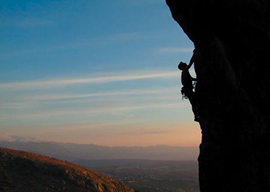
November 15, 2010

In contrast, the crinkly-eyed Franco makes Ralston seem a likeable slacker goof who merely forgot to tell his parents where he was going. Franco’s acting is fine, but he can”t overcome that he looks delicate, citified, indoorsy, friendly, and modest”all of which Ralston is not.
Rather than a plucky underdog, the real-life Ralston resembles a shorter version of basketball great Bill Walton, that exemplar of a post-1960s Western American archetype: the sportsman who combines trippy tastes (Walton followed the Grateful Dead, while Ralston, a generation younger, followed Phish) with a hunger for personal challenge and technical excellence that can be hard on the mere mortals around him. This engineer-hippie-daredevil combination included my old Scoutmaster, whom I helped carry on a stretcher out of the Sierras in 1971 after he slid 90 feet down a cliff while rock climbing.
A recent study found that climbers suffer posttraumatic stress disorder after severe injuries only one-seventh as much as soldiers and firemen do. (Indeed, three months later, my Scoutmaster backpacked six miles on his crutches.)
Ralston’s bestselling memoir, Between a Rock and a Hard Place, reveals him to be a more ambitious and polarizing figure than 127 Hours lets on. The film leaves out Ralston’s backstory: His springtime jaunt through Canyonlands National Park was only a vacation from his long-term project of becoming the first man ever to climb all of Colorado’s dozens of 14,000-foot peaks…solo…in winter”a goal so dangerous, it made him controversial even among mountaineers.
Mountain climbing has long attracted people of the highest competence, intelligence, and literacy (books by climbers are innumerable) who do things the rest of us find crazy. The first mountaineering legend, George Mallory, who died near Everest’s summit in 1924, was close to the Bloomsbury coterie. Mallory’s three-word explanation for why he climbed Everest””Because it’s there””fascinated and frustrated literary intellectuals for generations.
Boyle, however, isn”t interested in exploring any of the traditional climbing conundrums. He doesn”t even like nature much. “I’m not a wilderness person at all,” he explains. “I was riveted by it because I thought it was a victory for the city over the wilderness.”
127 Hours is a triumph for superficiality in the Man v. Mountain genre long addicted to Deep Thoughts.